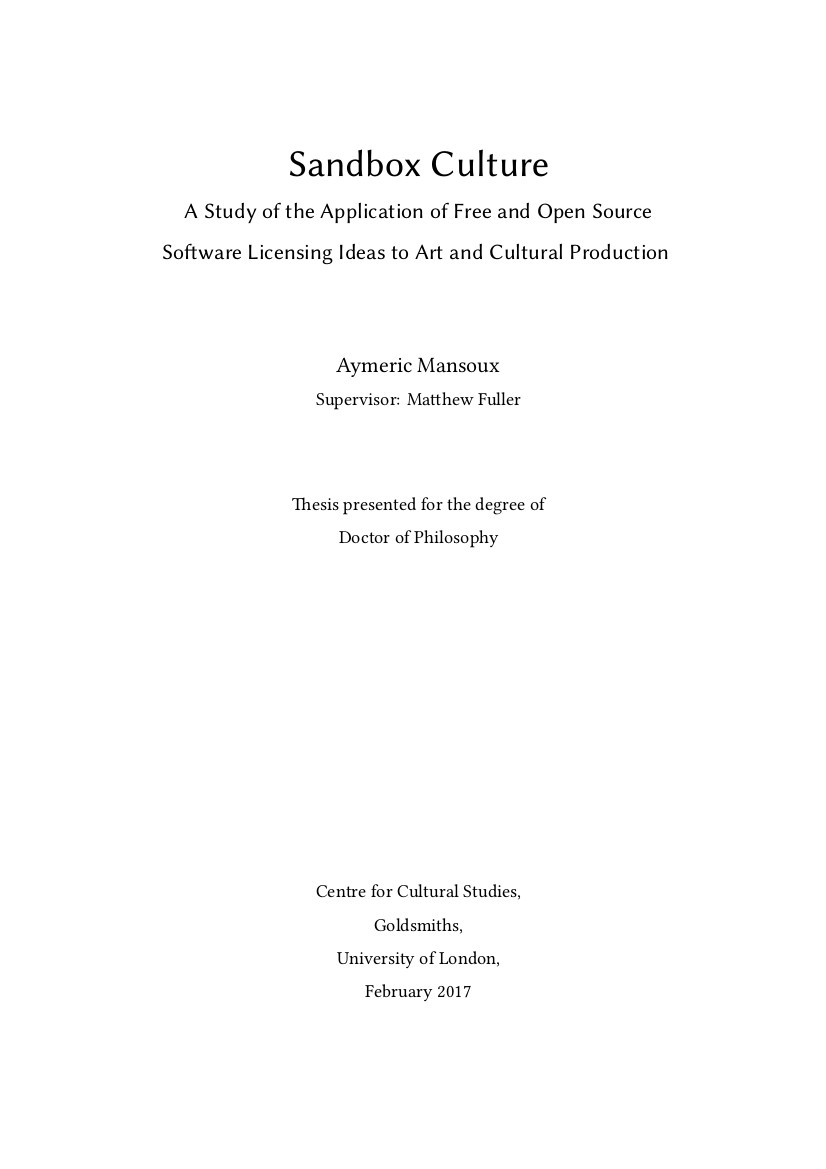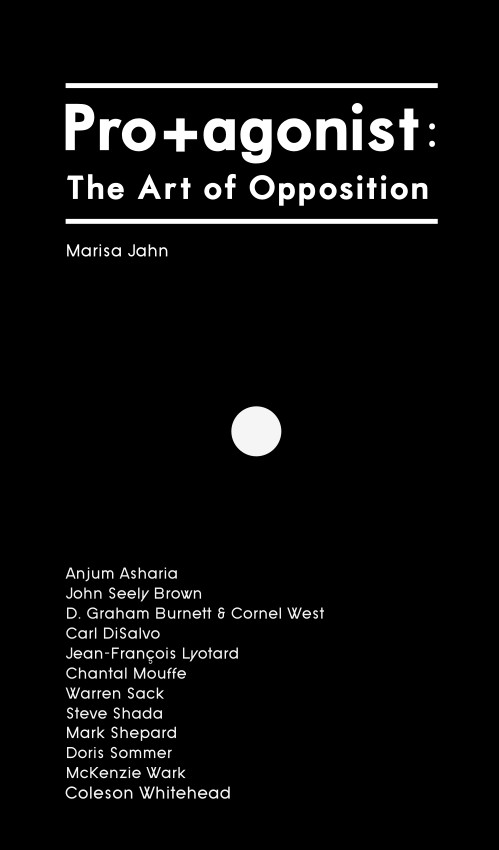Aymeric Mansoux: Sandbox Culture: A Study of the Application of Free and Open Source Software Licensing Ideas to Art and Cultural Production (2017)
Filed under thesis | Tags: · agonism, copyright, cultural production, digital culture, floss, free culture, intellectual property, law, network culture, open source, social movements

“In partial response to the inability of intellectual property laws to adapt to data-sharing over computer networks, several initiatives have proposed techno-legal alternatives to encourage the free circulation and transformation of digital works. These alternatives have shaped part of contemporary digital culture for more than three decades and are today often associated with the “free culture” movement. The different strands of this movement are essentially derived from a narrower concept of software freedom developed in the 1980s, and which is enforced within free and open source software (FLOSS) communities. This principle was the first significant effort to articulate a reusable techno-legal template to work around the limitations of intellectual property laws. It also offered a vision of network culture where community participation and sharing was structural.
From alternate tools and workflow systems, artist-run servers, network publishing experiments, open data and design lobbies, cooperative and collaborative frameworks, but also novel copyright licensing used by both non-profit organisations and for-profit corporations, the impact on cultural production of practices developed in relation to the ideas of FLOSS has been both influential and broadly applied. However, if it is true that FLOSS has indeed succeeded in becoming a theoretical and practical model for the transformation of art and culture, the question remains at which ways it has provided such a model, how it has been effectively appropriated across different groups and contexts and in what ways these overlap or differ.
Using the image of the sandbox, where code becomes a constituent device for different communities to experience varying ideologies and practices, this dissertation aims to map the consequent levels of divergence in interpreting and appropriating the free and open source techno-legal template. This thesis identifies the paradoxes, conflicts, and contradictions within free culture discourse. It explores the tensions between the wish to provide a theoretical universal definition of cultural freedom, and the disorderly reality of its practice and interpretation. However, despite the different layers of cultural diffusion, appropriation, misunderstanding and miscommunication that together form the fabric of free culture, this dissertation argues that, even though feared, fought, and criticised, these issues are not signs of dysfunctionality but are instead the evidence of cultural diversity within free culture. This dissertation will also demonstrate that conflicts between and within these sandboxes create a democratic process that permits the constant transformation of the free and open source discourse, and is therefore something that should be embraced and neither resisted nor substituted for a universal approach to cultural production.”
Includes an anthology of proto-free culture licenses, 1998-2002 (pp 382-452).
PhD Dissertation
Supervisor: Matthew Fuller
Publisher Centre of Cultural Studies, Goldsmiths, University of London, 2017
xxxviii+486 pages
via author
Marisa Jahn (ed.): Pro+agonist: The Art of Opposition (2012)
Filed under book | Tags: · activism, agonism, art, gaming, performance, politics, protest

“This is a book and set of playing cards that explore the productive possibilities of ‘agonism,’ or a relationship built on mutual incitement and struggle. Designed in black and blue — the colors of a good bruise — Pro+agonist brings together writings by interdisciplinary artists, scientists, CEO’s, crackpots, war strategists, psychotherapists, and philosophers who raise questions about the importance of political dissent, the function of discord in discourse, the rules of escalating conflict, the roles of parasites within systems, the ins and outs of concord and congress, and more. The book’s introduction, written as a disagreement between a cast of fictional characters, is (arguably) more stimulating than if it were written from a single, unified perspective. Readers will emerge with a greater appreciation for duking it out and taking it to the streets.
p.s. – There’s a half-inch hole running through the center of both the book and the playing cards so that you can peek through, frame the Other, and keep them with you as you read along.”
With texts by Anjum Asharia, John Seely Brown, D. Graham Burnett + Cornel West, Carl DiSalvo, Marisa Jahn, Jean-Francois Lyotard, Chantal Mouffe, Warren Sack, Steve Shada, Mark Shepard, Doris Sommer, McKenzie Wark, Coleson Whitehead
Pro+agonist was commissioned by Northern Lights.mn and Walker Art Center for the symposium Discourse and Discord: Architecture of Agonism from the Kitchen Table to the City Street.
Publisher Northern Lights.mn, Walker Art Center, & REV-, Spring 2012
ISBN 9780985185305
117 pages
via Inge Hoonte
PDF (updated on 2017-7-10)
Comment (0)Chantal Mouffe: The Democratic Paradox (2000–) [EN, ES, PL]
Filed under book | Tags: · agonism, agonistic pluralism, antagonism, deliberative democracy, democracy, ethics, neoliberalism, philosophy, pluralism, politics, social democracy

“A new understanding of democracy that acknowledges the inescapable and essential antagonism in its workings.
From the theory of ‘deliberative democracy’ to the politics of the ‘third way’, the present Zeitgeist is characterized by attempts to deny what Chantal Mouffe contends is the inherently conflictual nature of democratic politics. Far from being signs of progress, such ideas constitute a serious threat to democratic institutions. Taking issue with John Rawls and Jürgen Habermas on one side, and the political tenets of Blair, Clinton and Schröder on the other, Mouffe brings to the fore the paradoxical nature of modern liberal democracy in which the category of the ‘adversary’ plays a central role. She draws on the work of Wittgenstein, Derrida, and the provocative theses of Carl Schmitt, to propose a new understanding of democracy which acknowledges the ineradicability of antagonism in its workings.”
Publisher Verso, London, 2000
ISBN 1859842798, 9781859842799
143 pages
The Democratic Paradox (English, updated on 2017-10-16)
La paradoja democrática (Spanish, trans. Tomás Fernández Aúz and Beatriz Eguibar, 2003, added on 2020-10-23)
Paradoks demokracji (Polish, trans. Wojciech Jach, Magdalena Kamińska, and Andrzej Orzechowski, 2005, added on 2020-10-23)

